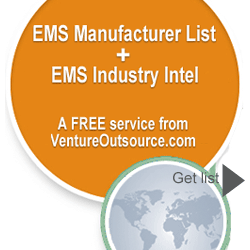
Electronic OEM brand equipment companies sourcing contract electronics services with EMS companies or original design manufacturing (ODM) service providers can help make sure their design partners identify any design problems early in the product development cycle to help keep outsourcing product launch on time and on budget. (See also: Hardware pilot launch goals and objectives for manufacturing, quality and test)
In your search results, you can further target ODM or EMS provider options by choosing End Markets, then selecting Go.
Within electronics design and prototyping services, when EMS engineers create working samples, EMS (and ODM) firms verify OEM designs meet specs using engineering verification testing (EVT). If product specs are not met EMS partners can still make design changes (early) in the stage of product development services. Any engineering changes post development, or worse, in- or post-production, are considerably more expensive.
The information below was used in a OEM computing tablet or PC notebook EMS program but OEMs can reference this article with their EMS partners across a variety of product markets and industries.
Engineering validation test (EVT)
The typical EVT phase includes:
- Basic functional test
- Power measurement
- Signal quality test
- Conformance test
- EMI pre-scan
- Thermal and 4 corner test
- Basic parametric measurements, specification validation
Depending on your product complexity or special testing requirements or unique or custom components your EMS provider may divide your EVT phase into several stages.
In your search results, you can further target EMS provider options by choosing other Industries and/or Services, then selecting Go.
Design validation test (DVT)
Your DVT phase of your outsourcing program with your EMS provider helps validate quality product design services were employed and verifies your product meets predetermined design objectives. A typical DVT phase includes:
- Full functions testing
- Performance testing
- Climatic and environmental stress screening (ESS) testing
- Reliability testing
- Mechanical test
- Mean time between failures (MTBF) prediction
- Conformance / compliance, regulatory testing
- Electromagnetic interference or compatibility (EMI, EMC) testing and certification
- Safety certification
READ
RFQ process for new product launch with EMS manufacturers
OEM pilot build spec targets for EMS manufacturing
EMS market and EMI, EMC testing
Considerations for interference from radio frequency (RF) emissions with electronics hardware products have existed longer than EMC/EMI regulations, which include limits and measurement of RF, and can vary around the world plus, EMC/EMI regulations can change.
In your search results, you can further target EMS provider options by choosing End Markets and/or Services, then selecting Go.
This last aspect alone makes product development more challenging for some EMS engineering design teams vs. engineering teams at other EMS or ODM firms, depending on your OEM product market, design specs.
RELATED
Suggested prototype build volumes (units) for new product launch
First time EMI/EMC product test failures can also be high (30% to 50%), and higher among certain product electronics services markets. A number of factors that can contribute to EMI/EMC test failures include software being used, product systems architecture (such as number of layers in your printed circuit board), smaller circuit dimensions, length RF signal traces (vs embedded), and many other factors.
Products destined for medical electronics markets tend to have slightly higher EMI/EMC test yields. Depending on product specs and performance, this can be due to the high amount of scrutiny that goes into electronic medical product design and functions/features.
RELATED DOCUMENTS
OEM Audit of EMS Design-for-Manufacturing (DFM) Capability (13 pages)
OEM Audit of Original Design Manufacturer (ODM) (9 pages)
But, before any product reaches its place with end users in the field, it still must pass a pilot validation test before entering production.
Pilot validation test (PVT)
The pilot validation test phase for your product confirms to the EMS provider your product can be produced and assembled in a volume production facility and finished systems of your product will pass any end point or market tests your product faces for safety, certification and regulatory compliance. In PVT any software bugs are corrected before your product is deemed design-for-manufacturing (DfM) and manufacturing ready.
In your search results, you will be able to further target provider options by choosing End Markets and/or other Services.
This all assumes your product has passed feasibility analysis, and usability and product desireability are both acceptable – the intention being your product makes sense from a user’s viewpoint and people / organizations will or have a demand for your product.
Get list of EMS manufacturers for your requirements (Its free)
Save time and money. Find quality EMS manufacturers. Fast. Venture Outsource has a massive, global database of contract electronic design and manufacturing capabilities. Speak with a Provider Advisor.
“Was able to very quickly find details on the important elements of setting up EMS and ODM partnerships, talked with an advisor for personalized info on quality providers matching our requirements while getting up to speed quickly about the industry and connect with key staff from like-minded companies and potential partners. Great resource.”
— Jeff Treuhaft, Sr. Vice President, Fusion-IO
Advisors tell you matches we find for your needs, answer your questions and, can share EMS industry knowledge specific to your industries and markets.









